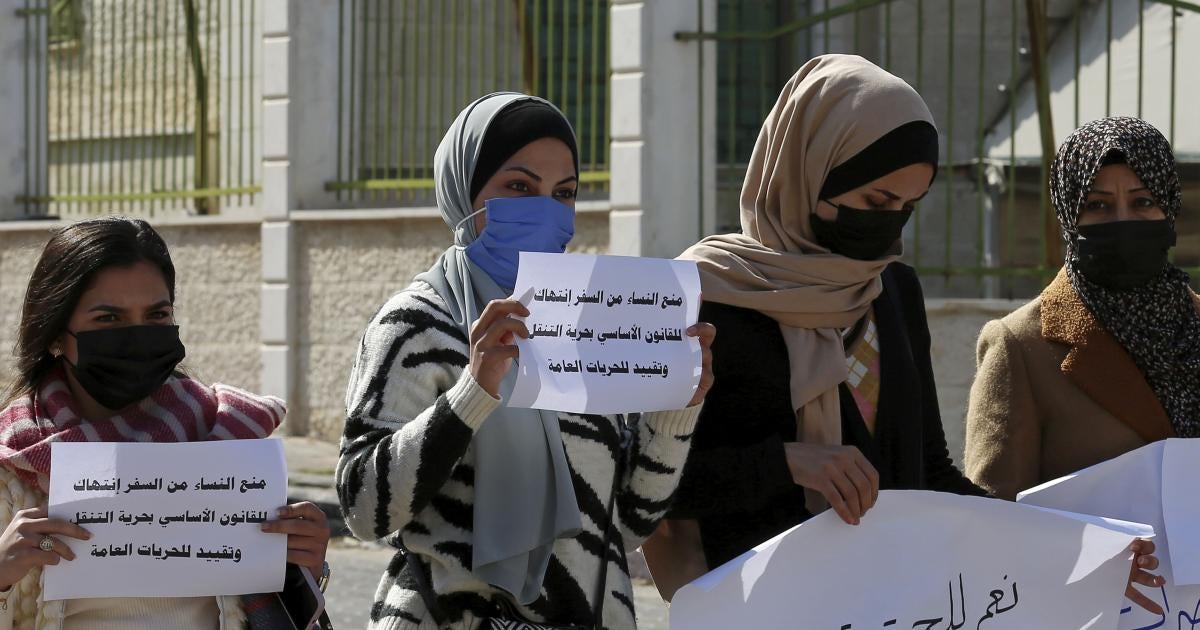- Many Middle East and North Africa countries still prevent women from moving freely in their own country or traveling abroad without the permission of a male guardian.
- Women in the region are fighting rules that authorities often claim are for their protection, but that deprive women of their rights and enable men to control and abuse them at will.
- All authorities in the Middle East and North Africa should eliminate any and all discriminatory restrictions on women’s freedom of movement including all male guardianship rules.
(Beirut) – Many Middle East and North African countries still prevent women from moving freely in their own country or traveling abroad without the permission of a male guardian, Human Rights Watch said in a report released today.
The 119-page report, “Trapped: How Male Guardianship Policies Restrict Women’s Travel and Mobility in the Middle East and North Africa,” says that although women’s rights activists have succeeded in securing women’s increased freedoms in many countries in the region, old and new restrictions require women to seek permission from their male guardian – typically their father, brother, or husband – to move within their country, obtain a passport, or travel abroad. Human Rights Watch also found that in a number of countries, women cannot travel abroad with their children on an equal basis with men.
“From leaving the home to leaving the country, authorities in the Middle East and North Africa are imposing varying restrictions on women’s right to freedom of movement,” said Rothna Begum, senior women’s rights researcher at Human Rights Watch. “Women in the region are fighting against restrictions that authorities often claim are for their protection, but in reality, deprive women of their rights and enable men to control and abuse them at will.”
The report is based on a comparative analysis of dozens of laws, regulations, and policies, as well as information provided by lawyers, activists, and women in 20 countries in the Middle East and North Africa.
Male guardianship policies in the region, which also exist beyond the Middle East, have been influenced by a broader history of laws and traditions around the world, including European legal traditions, that gave or still give men control over women’s lives.
Fifteen countries in the region still apply personal status or family laws that require women to either “obey” their husbands, live with them, or seek their permission to leave the marital home, work, or travel. Courts can order women to return to their marital homes or lose their right to spousal maintenance.
In some countries, these rules are becoming more entrenched. In March 2022, Saudi Arabia issued its first written Personal Status Law, which codified the long-standing practice of requiring women to obey their husband “in a reasonable manner” or lose financial support from their husbands if they refuse to live in the marital home “without a legitimate excuse.”
Women can be arrested or detained or forced to return home if male guardians in Jordan, Kuwait, Qatar, and Saudi Arabia report that they are “absent” from their homes. In Saudi Arabia and Yemen, women are still not allowed to leave prison without a male guardian’s approval.
In countries experiencing conflict, some armed groups have imposed guardianship restrictions in areas under their control. In parts of Syria under the control of some armed groups, women are required to be accompanied by a mahram (husband or other close male relative). Houthi authorities who control parts of Yemen have increasingly required women to travel with a mahram or to provide their male guardian’s written approval. Such rules have forced many female Yemeni staff at nongovernmental organizations and United Nations agencies to leave their jobs, losing much-needed income for their families.
While women’s rights activists in the region have made some gains, they continue to fight against discriminatory mobility restrictions. In 2018, following decades of advocacy and activism, Saudi Arabia allowed women to drive, but other restrictions remain. Women in Iran continue their decades-long fight against the mandatory hijab, a central feature of the nationwide “women, life, freedom” protests that erupted after the death in custody of Mahsa (Jina) Amini in September 2022.
Some state universities, including in Bahrain, Iran, Kuwait, Oman, Qatar, Saudi Arabia, and the United Arab Emirates, require women to show they have male guardian permission before they can go on field trips or stay at or leave campus accommodations or grounds. In some countries, women may also face discrimination trying to rent apartments or stay in hotels if they are not married or do not have a male guardian’s permission.
In a positive advance, most governments in the region now allow women to obtain passports and travel abroad without requiring guardian permission. In August 2019, after much campaigning by Saudi women’s rights activists, Saudi authorities amended its rules to allow women over age 21, like men, to obtain passports and travel without guardian permission.
Iran, Qatar, and Yemen remain outliers. In Iran, married women must show their husband’s permission to obtain a passport, and to travel. In Qatar, interior ministry rules require unmarried Qatari women under age 25 to show permission from their male guardians to travel abroad; while Qatari men from age 18 do not. Yemen’s de facto policy requires Yemeni women to show their male guardian’s permission to obtain a passport.
Qatar also allows male guardians to apply to a court to impose travel bans against any of their female relatives, including their wives. Authorities in Iran, Gaza (Palestine), Kuwait, Saudi Arabia, and Yemen also allow male guardians to ban women’s travel abroad.
Some restrictions are relatively new. Hamas authorities in Gaza issued restrictions in February 2021 that means an unmarried woman, even if able to leave Gaza amid sweeping Israeli and Egyptian movement restrictions, can be prevented from traveling as soon as her male guardian applies for a court-ordered ban. In August 2022, Houthi authorities in Yemen, who control large parts of the country, expanded restrictions so that women cannot travel or leave their areas within the country or travel abroad without a mahram. In May 2023, Libya’s Internal Security Agency, a body linked to the Tripoli-based Government of National Unity, one of the two governments in Libya vying for legitimacy and control, began requiring Libyan women traveling without a male escort to complete a detailed form about the reasons for their travel and past travel.
Women can also face discriminatory restrictions on traveling abroad with their own children. Fourteen countries in the region do not allow women to obtain passports for their own children on an equal basis with men. Nine countries, officially or in practice, require women to obtain permission from the child’s father to travel abroad with their children, while men face no similar requirement.
“Even as women’s rights activists win some freedoms, the authorities seek to take others away, rolling back not just women’s rights, but harming children, families and society,” Begum said. “All authorities in the Middle East and North Africa should eliminate any and all discriminatory restrictions on women’s freedom of movement including all male guardianship rules.”



